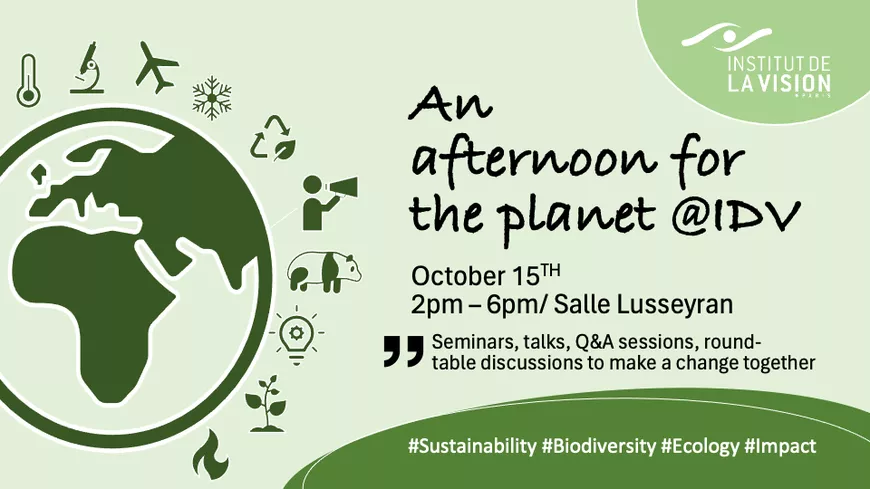An afternoon for the planet @IDV
We are delighted to announce an afternoon dedicated to the ecological transition at the Institut de la Vision. As part of our their new mission as green transition coordinators, Matthew Chalk & Matias Goldin invite you to come and share this special moment.

Why this event?
🌎 Our planet is facing unprecedented challenges. Climate change and the collapse of biodiversity are having a direct impact on our health and our environment. As researchers, we have an essential role to play in understanding these issues and proposing innovative solutions. This event will be an opportunity to hear experts discuss the impacts of climate change on health and biodiversity, as well as sustainable scientific practices but also an opportunity for the members of IdV to get informed and involved in the actions we can take together.
This afternoon's program
2.00 pm: ➡️ Introduction
2:20 pm: 🌸 "The collapse of biodiversity and climate disruption"
Tatiana Giraud, (DR CNRS, Université Paris-Saclay), will shed light on the close links between these two crises and their consequences.
3:00 pm: 🩺 "Health as a lever for action against climate change"
Kévin Jean (junior professor in Health and Global Change,ENS) will present the impacts of climate change on our health and the actions we can take.
3:40 pm: ☕️ Coffee and snacks
4:00 pm: 🌿 "From carbon to meaning: experimenting for sustainable science"
Olivier Ragueneau (DR CNRS, Brest) will share his experience in sustainable research and give us keys to take action on a daily basis.
4:40 pm: 🎯 Round-up & plan of action for the Vision Institute!
Matias Goldin & Matthew Chalk
5:00 pm: 💬 Open discussion
A time for exchange will be devoted to everyone's questions and proposals. Together, we'll think about the concrete actions we can implement at IdV to contribute to the ecological transition.
Time and place
📅 Date: Tuesday, October 15
📍 Location: Conference room, new building
🕒 Time: 2pm to 6pm
Why participate?
🌍 Gain a better understanding of environmental issues.
💡 Discover innovative initiatives.
🌱 Contribute to building a more sustainable future.
🤝 Exchange with other players in the Institute.
We are counting on your presence to make this afternoon a success!
About the speakers
Tatiana Giraud
"Biodiversity loss and climate change"
Today's threats to biodiversity are manifold, and climate change is a major factor. The collapse of biodiversity also has repercussions on the climate, and exacerbates the consequences of global change on human populations, while nature-based solutions are among the most effective in mitigating climate disruption. To conserve biodiversity and the countless services it provides, we need to understand how biodiversity was formed and what factors influence its dynamics. The sciences of ecology and evolution are also essential to understanding the extent and consequences of the current biodiversity crisis, particularly for human societies, as well as possible solutions. Climate change, but also habitat destruction, pollution and invasive species, are responsible for a collapse in biodiversity, which will rapidly have major consequences for human societies through the decline in the ecosystem services we derive from biodiversity.
This talk is based on the book "L'attention au Vivant", published by Editions de l'Observatoire (2024).
Tatiana Giraud is an agronomy engineer and CNRS research director at Université Paris-Saclay. She is a member of the French Academy of Sciences and a former professor at Ecole Polytechnique, as well as guest professor of the annual Biodiversity and Ecosystems Chair at Collège France.
Kévin Jean
"Health as a lever for action in the face of climate change"
Climate change is already having a negative impact on human health. No region of the world is immune, and these impacts will only worsen as the global thermometer rises. While assessing the health risks associated with climate change is a major challenge in terms of risk anticipation and preparedness, the links between health and climate can also be considered from another angle: that of the health co-benefits of climate policies. Indeed, policies to reduce greenhouse gas emissions in transport, industry, housing or agriculture can potentially translate into improvements in air quality and diet, or an increase in physical activity. As a result, climate policies could deliver significant public health benefits in the short term.
In this presentation, we will illustrate the notion of co-benefits, the methods used to assess them, and show how they can constitute a potentially favorable framework for encouraging transformative climate policies.
Kévin Jean is an epidemiologist and junior professor in Health and Global Change at the ENS Biology Department (IBENS, Eco-evolution math team). In his research activities, he combines the tools of epidemiology and mathematical modeling to evaluate prevention strategies and document the health co-benefits of climate change adaptation and mitigation policies. His work has also focused on prevention of infectious diseases (HIV, yellow fever, HCV, Covid-19) and occupational diseases (musculoskeletal disorders).
Olivier Ragueneau
"From carbon to meaning: experimenting for sustainable science"
Climate action is urgent, and science holds a strong responsibility in driving transformation. How can science reduce its carbon footprint while enhancing its quality and social sustainability? We present an original experiment involving 22 French research labs to tackle this challenge before calling for its expansion beyond France and academia.
Ref : Ragueneau & Sabbagh, One Earth, May 17th 2024
Olivier Ragueneau is Director of Research at the CNRS and a member of the Laboratoire des Sciences de l'Environnement Marin in Brest. An oceanographer, he is currently working in the emerging field of sustainability science, and has been exploring the relationship between science and society for many years, through action and reflection.
